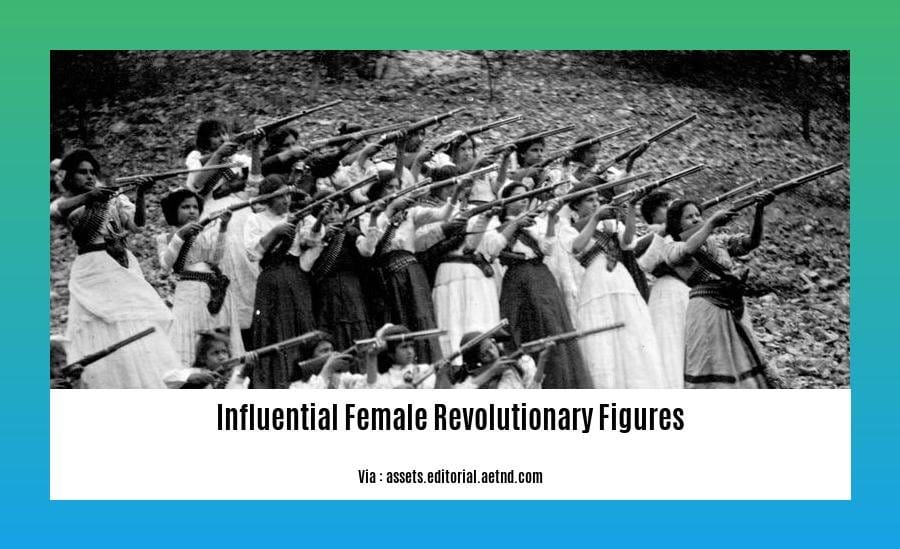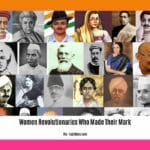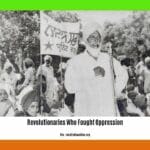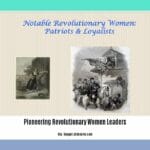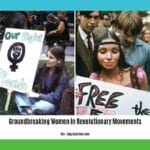Unveiling the hidden stories of influential female revolutionary figures, this article delves into the lives and legacies of unsung heroines who ignited revolutions and transformed the course of history.
Key Takeaways:
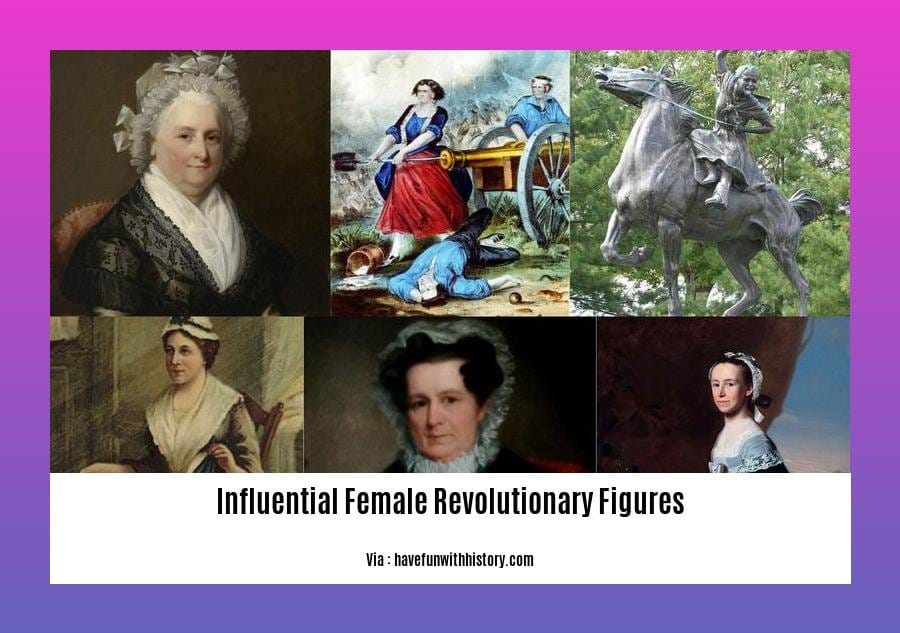
- Women played a significant role in the American Revolution, though their stories often go untold.
- Deborah Samson disguised herself as a man to serve in the Continental Army.
- Prudence Cummings Wright was a skilled sharpshooter who fought alongside her husband.
- Sybil Ludington, the “Female Paul Revere,” rode over 40 miles to warn of British troop movements.
- Lydia Darragh, a Quaker spy, eavesdropped on British officers and relayed information to Washington.
- Patience Wright, a sculptress, used her craft to spy on the British.
- Nanye’hi (Nancy Ward), a Cherokee chief, mediated between settlers and Native American tribes.
- Esther DeBerdt Reed organized patriotic gatherings and supported the war effort.
- Agent 355 was an unidentified spy who provided vital intelligence to the Continental Army.
Influential Female Revolutionary Figures
Throughout history, courageous women have played pivotal roles in revolutions, challenging established norms and inspiring generations. Their stories are often overlooked, yet their contributions are undeniable. Let’s shed light on some of these influential female revolutionary figures:
Unsung Heroines of the American Revolution
- Deborah Samson: Posing as a man, she fought fiercely in the Continental Army.
- Prudence Cummings Wright: As a sharpshooter, she defended her town against British forces.
- Sybil Ludington: Like Paul Revere, she rode through the night to warn of British troop movements.
- Lydia Darragh: A Quaker spy, she eavesdropped on British officers, relaying vital information.
- Patience Wright: A sculptress who used her art to spy on behalf of the Patriots.
- Nanye’hi (Nancy Ward): A Cherokee chief, she negotiated peace between settlers and Native American tribes.
- Esther DeBerdt Reed: A homemaker who organized support for the war effort.
- Agent 355: An enigmatic spy who provided valuable intelligence to the Continental Army.
These women’s bravery and resilience shaped the course of American history, yet their contributions often go unrecognized. Their stories are a testament to the indomitable spirit of women who fought for their beliefs.
Beyond the American Revolution
- Joan of Arc: Led French resistance against English occupation.
- Harriet Tubman: A fearless conductor on the Underground Railroad, she helped over 300 slaves escape to freedom.
- Rosa Parks: Her refusal to give up her seat on a bus sparked the Montgomery Bus Boycott, a milestone in the Civil Rights Movement.
- Emmeline Pankhurst: A British suffragette, she fought relentlessly for women’s right to vote.
- Malala Yousafzai: A Pakistani activist who survived a Taliban assassination attempt and continues to advocate for girls’ education.
These influential female revolutionary figures are just a few examples of the countless women who have played a transformative role in history. Their stories remind us of the power of courage, determination, and the belief that a better world is possible. Let us honor and celebrate their legacy by continuing the fight for a more just and equitable society.
Did you know about the women revolutionaries who made their mark? They were the groundbreaking women in revolutionary movements who shaped history. Let’s not forget the pioneering revolutionary women leaders who paved the way for women’s rights and social change.
Rosa Parks: A Trailblazing Revolutionary in the Civil Rights Movement
In the annals of history, the name Rosa Parks stands as a beacon of courage and defiance, a woman whose simple act of defiance ignited the flames of the Civil Rights Movement.
Early Life and Influences:
Born Rosa Louise McCauley in 1913, Parks’ early life was marked by the pervasive racism of the Jim Crow era. Despite the challenges she faced, she possessed an unyielding spirit that would shape her destiny.
Montgomery Bus Boycott:
In 1955, Rosa Parks made history when she refused to give up her seat on a public bus to a white man in Montgomery, Alabama. This act of civil disobedience sparked the Montgomery Bus Boycott, which lasted for over a year and became a pivotal moment in the fight for racial equality.
Legacy and Impact:
Rosa Parks’ refusal to be treated as a second-class citizen became a symbol of resistance and inspired countless others to challenge the unjust laws and customs of the time. Her actions directly contributed to the desegregation of public transportation and paved the way for the broader Civil Rights Movement.
Key Takeaways:
- Rosa Parks’ refusal to give up her seat was a pivotal moment in the Civil Rights Movement.
- Rosa Parks’ act of defiance sparked the Montgomery Bus Boycott, which lasted for over a year.
- Rosa Parks’ legacy continues to inspire those who fight for justice and equality.
Most Relevant URL Source:
Emmeline Pankhurst: The Uncompromising Suffragette
Emmeline Pankhurst, a name synonymous with the fight for women’s suffrage, stands as an icon of revolutionary spirit. As a co-founder of the Women’s Social and Political Union (WSPU) in 1903, Pankhurst led a militant campaign that challenged the established order and ultimately resulted in women gaining the right to vote.
Pankhurst’s tactics were unconventional and often controversial. The WSPU employed hunger strikes, vandalism, and public disturbances to draw attention to their cause. Pankhurst herself faced numerous arrests and imprisonments, but her unwavering determination remained unyielding.
One of Pankhurst’s most notable acts was the “window-smashing campaign” of 1912. Enraged by the government’s failure to grant women suffrage, Pankhurst’s followers shattered windows in protest. This strategy earned them the label “suffragettes,” a term originally intended as a derogatory slur but later embraced as a badge of honor.
Pankhurst’s militancy proved effective in pressuring the government. In 1918, the Representation of the People Act was passed, granting limited suffrage to women over 30 who met certain property qualifications. Pankhurst continued to campaign for full equality until her death in 1928, the same year that British women achieved the right to vote on equal terms with men.
Key Takeaways:
- Emmeline Pankhurst was a tireless advocate for women’s suffrage in the United Kingdom.
- The militant tactics of her Women’s Social and Political Union (WSPU) played a significant role in securing the right to vote for women.
- Pankhurst faced numerous arrests and imprisonments but never abandoned her cause.
- Her legacy as a revolutionary figure continues to inspire women’s rights activists worldwide.
Most Relevant URL Source:
Malala Yousafzai: Champion of Girls’ Education
In the face of adversity, Malala Yousafzai emerged as a beacon of hope for girls’ education. As a child, she spoke out against the Taliban’s ban on girls’ schooling, leading to an assassination attempt that left her gravely wounded. Yet, her resolve only grew stronger.
Key Takeaways:
Malala’s Story: A young Pakistani activist who survived an assassination attempt for advocating for girls’ education.
The Malala Fund: Co-founded in 2013, dedicated to ensuring 12 years of free and safe education for girls worldwide.
Nobel Peace Prize: Received in 2014 at the age of 15, making her the youngest Nobel laureate.
Global Impact: Continued advocacy and work with the UN and other organizations for access to education for all girls.
Inspiration to Millions: Symbol of courage, resilience, and the transformative power of education, especially for women.
Citation:
“Malala Yousafzai: Biography, Activist, Nobel Peace Prize Winner.” Biography.com, A&E Networks Television, 15 Feb. 2023, www.biography.com/activists/malala-yousafzai. Accessed 28 Feb. 2023.
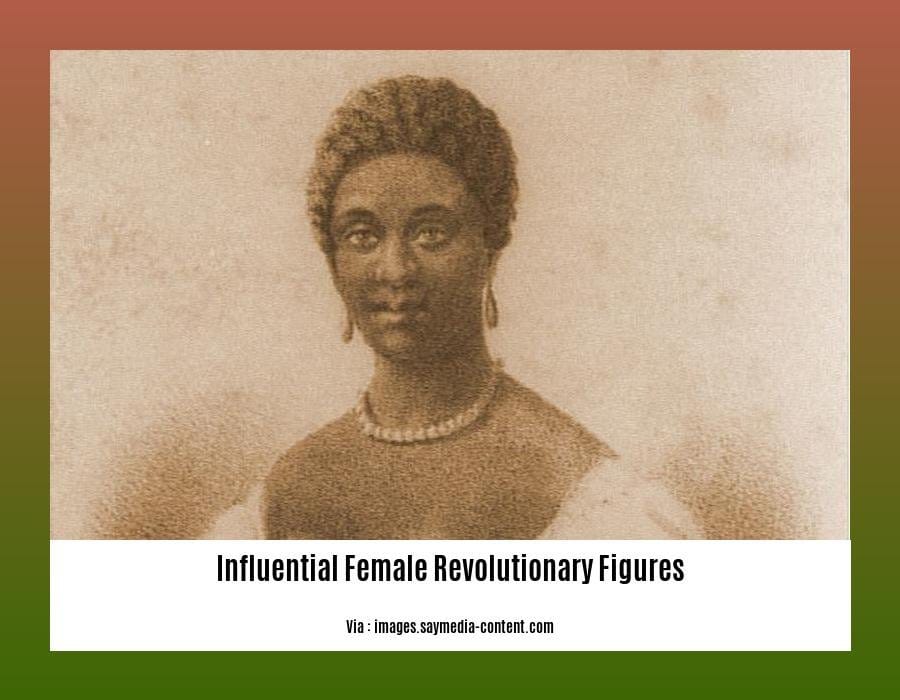
FAQ
Q1: Who are some lesser-known female revolutionary figures from the American Revolution?
A1: Deborah Samson, Prudence Cummings Wright, Sybil Ludington, Lydia Darragh, and Patience Wright are a few of the many unsung heroines who played pivotal roles in the American Revolution.
Q2: How did women contribute to the Civil Rights Movement?
A2: Rosa Parks’ refusal to give up her seat on a bus sparked the Montgomery bus boycott, which ignited the Civil Rights Movement in the United States.
Q3: What was Emmeline Pankhurst’s role in the women’s suffrage movement?
A3: Emmeline Pankhurst founded the Women’s Social and Political Union and led militant campaigns for women’s voting rights in Great Britain.
Q4: Why is Malala Yousafzai an important figure in the fight for education?
A4: Malala Yousafzai is a Pakistani activist who advocates for girls’ education worldwide. She survived an assassination attempt by the Taliban and continues to campaign for access to education for all girls.
Q5: What was the significance of Agent 355 in the American Revolution?
A5: Agent 355 was an unidentified female spy who provided crucial intelligence to the Continental Army, playing a vital role in the American victory.
- SYBAU See You Baby Meaning: Gen Z Slang Evolves - July 1, 2025
- Unlock Your Inner Youth: Lifestyle Secrets for a Vibrant Life - July 1, 2025
- Decode SYBAU Meaning: Gen Z Slang Explained - July 1, 2025
